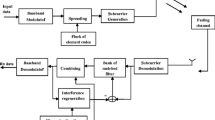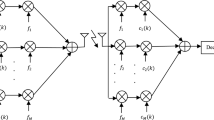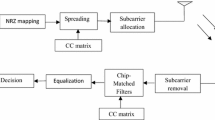Abstract
In this paper, effects of carrier frequency offset on performance of uplink MC-CDMA (Multi-Carrier Code Division Multiple Access) system in Nakagami fading channel are investigated through the theoretical analysis and Monte Carlo computer simulations. Both perfect maximal-ratio combining (MRC) and equal gain combining (EGC) receivers are analyzed; the impact of imperfect channel fading estimation on the performance of MRC is also explored. The performance of MC-CDMA system is also compared with that of the conventional single-carrier DS-CDMA system. Our results indicate that the performance of MC-CDMA system is sensitive to even small values of carrier frequency offset and that the performance of MC-CDMA system improves as number of subcarriers increases. In perfect channel fading estimation, the overall performance of MRC is superior to EGC. However, when imperfect or inaccurate channel fading estimation exists, which leads to serious performance degradation, EGC becomes superior to MRC.
Similar content being viewed by others
References
R. Prasad, CDMA for Wireless Personal Communications, Artech House: Boston, London, 1996.
S. Hara and R. Prasad, “Overview of Multicarrier CDMA”, IEEE Communications Magazine, pp. 126–133, 1997.
N. Yee, J.P. Linnartz and G. Fettweis, “Multi-carrier CDMA in Indoor Wireless Radio Networks”, IEICE Trans. Communiction, Vol. E77-B, pp. 900–904, 1994.
H. Steendam and M. Moeneclaey, “The Effect of Carrier Frequency Offsets on Downlink and Uplink MCDS-CDMA”, IEEE Journal on Selected Areas in Communications, Vol. 19, No. 12, pp. 2528–2536, 2001.
S. Kaiser, “OFDM-CDMA versus DS-CDMA: Performance Evaluation for Fading Channels”, in Proc. ICC'95, Seattle, June 1995, pp. 1722–1726.
S. Hara and R. Prasad, “Design and Performance of Multicarrier CDMA System in Frequency-Selective Rayleigh Fading Channels”, IEEE Transactions on Vehicular Technology, Vol. 48, pp. 1584–1595, 1999.
Jiang Yue and M.A. Do, “Performance of a Multicarrier CDMA System with Rayleigh Fading Multipath Channels”, Wireless Personal Communications, Vol. 18, pp. 93–105, 2001.
L. Tomba and W.A. Krzymien, “Sensitivity of the MC-CDMA Access Scheme to Carrier Phase Noise and Frequency Offset”, IEEE Transactions on Vehicular Technology, Vol. 48, No. 5, pp. 1657–1665, 1999.
J. Jang and K.B. Lee, “Effects of Frequency Offset on MC/CDMA System Performance”, Vehicular Technology Conference, IEEE 49th, Vol. 1, pp. 566–570, 1999.
Y. Kim et al., “Ber Computation of an MC-CDMA Systems with Carrier Frequency Offset”, IEEE International Conference, Vol. 5, pp. 2555–2558, 1999.
J. Park et al., “Performance of MC-CDMA Systems in Non-independent Rayleigh Fading”, IEEE International Conference on Communications, Vol. 1, pp. 506–510, 1999.
T. Kim et al., “Performance of an MC-CDMA System with Frequency Offsets in Correlated Fading”, IEEE International Conference, Vol. 2, pp. 1095–1099, 2000.
L.L. Chong and L.B. Milstein, “Comparing DS-CDMA and Multicarrier CDMA with Imperfect Channel Estimation”, in Proceedings of the 11th IEEE Signal Processing Workshop, Aug. 2001, pp. 385–388.
H. Suzuki, “A Statistical Model for Urban Radio Propagation”, IEEE Transactions on Communications, Vol. COM-25, pp. 673–680, 1977.
A. Papoulis, Probability, Random Variables and Stochastic Processes, 3rd edn., McGraw-Hill: New York, 1991.
M.S. Alouini, S.W. Kimand A. Goldsmith, “Rake Reception with Maximal-Ratio Equal-Gain Combining for DS-CDMA Systems in Nakagami Fading”, IEEE 6th International Conference on Communications, Vol. 2, pp. 708–712, 1997.
G. Ryzhik, Table of Integrals, Series and Products, ACA-DEMIC, 1980.
T. Eng and L.B. Milstein, “Coherent DS-CDMA Performance in Nakagami Multipath Fading”, IEEE Transactions on Communications, Vol. 43, Nos. 2–4, pp. 1134–1143, 1995.
M.J. Gans, “The Effect of Gaussian Error in Maximal Ratio Combiners”, IEEE Transaction on Communication Technology, Vol. COM-19, pp. 492–500, 1971.
Author information
Authors and Affiliations
Rights and permissions
About this article
Cite this article
Yang, Y., Jong, SL., Liu, JC. et al. Performance of Up-link MC-CDMA System with Frequency Offset and Imperfect Channel Estimation Simultaneously over Nakagami Fading Channels. Wireless Personal Communications 27, 247–265 (2003). https://doi.org/10.1023/B:WIRE.0000010148.85501.af
Issue Date:
DOI: https://doi.org/10.1023/B:WIRE.0000010148.85501.af




